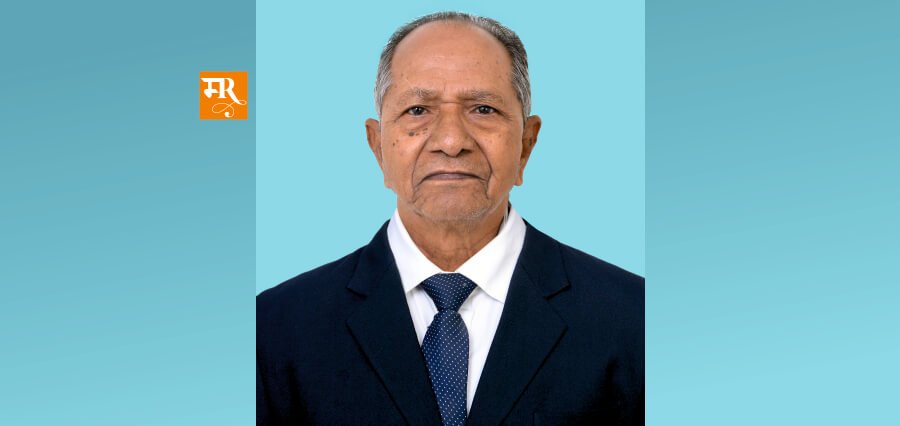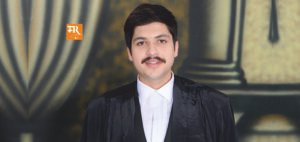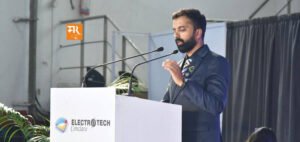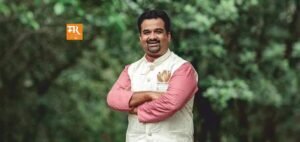A civil society is the best promise made by civilization to the collective human spirit. It is a promise of socio-political, economic, and legal equality, dignity, respect, personal growth, professional development, holistic progress, and social justice. Apart from democratic governments the world over, including India, the mother of democracy, and the world organizations and institutions, including those working in the human rights realm, there are innumerable spirited individuals passionately, persistently, constantly, and tirelessly working to uphold the humane cause of human rights, social justice, equality, and world peace through collaborative societal empowerment and the global upliftment of the downtrodden.
In this regard, shining like a crown jewel of Indian human rights and global peace efforts is Dr Sadashiv Ramji Awghad. A world-renowned International Human Rights and Peace Activist from Amravati, Maharashtra, Dr Sadashiv has been championing human rights and peace since he retired from the Indian public services. In his pursuit of contributing to the global social cause, Dr Sadashiv has earned numerous accolades, including
- Human Rights Nobel Award of Academic Excellence, 2023 (The highest honorary award of the Republic of India, instituted on 3rd January 2021.)
- Honorary Doctorate in Social Work from Global Human Rights Trust, an International Organization of the United Nations Department of Economic and Social Affairs.
- Harvard World Records’ Title.
- A certificate of appreciation for being one of the 50 Empowered Personalities from Foxstory India, alongside Prime Minister Narendra Modi.
- Bharatiya Ratan Award, 2023, of the ‘Most Prominent Social Activist’ from Oasis World Records.
- IN2Future’s International Eminence Excellence Awards, 2023, Dubai.
- Certificate of Appreciation from India Star World Records, 2023.
- KITES Education Icon Award for contribution to the education community, 2020.
- Dr Babasaheb Ambedkar Study Centre’s Certificate, 2016, from Sant Gadge Baba Amravati University.
A Compassionate Flame Ignited
Dr Sadashiv began his social work after completing his professional career. Upon retiring from his role as District Collector and District Magistrate, he gained extensive practical experience in public administration, law enforcement, court-related matters, redressal of public grievances, and the implementation of social welfare schemes for marginalized groups, including the poor, tribal communities, children, and economically weaker sections of society. With a deep familiarity with the law and the Indian Constitution, he decided to dedicate his retirement to the welfare of the common people, using his practical experience to defend the poor and illiterate from injustice and support public grievances and court-related issues.
In pursuit of this mission, Dr Sadashiv attended numerous human rights and peace education trainings, seminars, and workshops, which provided him with substantial knowledge on human rights issues and peace education. With a strong understanding of the Universal Declaration of Human Rights, he has been working selflessly as a social worker and international human rights and peace activist for the past 15 years, advocating for those affected by the misuse of power by higher authorities and the wealthy.
Dr Sadashiv believes that a social activist and human rights advocate must possess a deep understanding of the law to effectively defend against injustice. Such an individual must be bold, courageous, and fearless, willing to stand up for what is right, regardless of personal consequences. Selflessness is paramount, as a true social activist should not seek personal gain or recognition. Instead, they should dedicate themselves to serving the greater good.
Dr Sadashiv emphasizes the importance of peaceful methods over violence. He believes that peace is a powerful force that can bring about prosperity, brotherhood, and development. By advocating for non-violent solutions, social activists can inspire positive change and create a more just and equitable society.
Highlighting a Moving Reality
Reflecting on some of the most rewarding and challenging experiences in his journey as a social worker advocating for human rights and peace, Dr Sadashiv highlights a poignant truth: “Poverty is a violation of human rights.” Through his years of work, he has observed the harsh injustices faced by impoverished individuals who, due to ignorance, illiteracy, and a lack of resources, often find themselves disproportionately punished for minor infractions.
Dr Sadashiv shares his encounters with individuals who were imprisoned for minor acts of desperation—petty thefts of food or basic necessities like bread or a meal—committed in a bid to survive. In these cases, he notes, small misunderstandings, poor choices of words, or the mere act of using impolite language have led to severe consequences, including time in jail. Often, these individuals remain incarcerated far longer than necessary, their chances of release hindered by a lack of legal knowledge, inability to afford legal representation, or the absence of supportive family networks. This prolonged punishment for minor crimes highlights the cruel disparity between the treatment of impoverished individuals and that of the wealthy.
By contrast, Dr Sadashiv observes how those who are financially privileged, even if involved in larger offences, often leverage their resources to secure bail quickly and return to their lives with little interruption. For many, wealth affords them access to top legal advisors, bail funds, and influential networks, which enable them to navigate and exploit the legal system to their benefit. Such injustices reinforce a system where poverty is both a cause and consequence of rights violations, perpetuating a cycle of hardship that few manage to escape.
Dr Sadashiv is driven by a desire to bridge this divide and believes that every individual, regardless of socio-economic status, deserves fair and just treatment. Through his work, he has organized workshops and legal awareness programs to educate marginalized communities on their rights, empowering them with the knowledge to prevent such injustices. He has also advocated for systemic reforms, including improved access to legal aid for the impoverished and changes in bail policies that would provide equal opportunity for release, regardless of wealth.
In his journey, Dr Sadashiv has found both challenges and deeply rewarding moments. Each case where an innocent individual receives justice or a poor person gains the support they needs reaffirms his commitment to his cause. Through his tireless efforts, he aims to shine a light on these inequities, amplify the voices of the silenced, and create a more just and compassionate society where poverty is no longer a crime.
Achieving the Truest Social Justice
Dr Sadashiv reflects on an impactful initiative he led that underscores his commitment to promoting peace and human rights. The case involved a tribal, impoverished, and illiterate widow of a primary school teacher who had served for 20 years in the Zilla Parishad in Akola before passing away, leaving behind four children. Living in a small village with no source of income, the widow struggled to manage her family’s needs and educate her children. Despite multiple appeals to the Education Officer of the Zilla Parishad for family pension benefits, her requests were repeatedly denied, with the officer claiming she was not eligible.
When the widow sought Dr Sadashiv’s help, she shared that she had previously approached advocates and political figures, yet none took up her case. Undeterred, Dr Sadashiv reached out to several authorities, including the Education Officer, the CEO of the Zilla Parishad, the Deputy Director of Education, the Divisional Commissioner, and even the Secretary of the Government of Maharashtra in Mumbai. In each instance, she was denied the family pension.
Dr Sadashiv ultimately took the case to the State Human Rights Commission in Mumbai, where he personally presented arguments on her behalf, though without success. Finally, he filed a writ petition/PIL with the Honorable Supreme Court of India, appealing on humanitarian grounds. After a 42-year battle (since 1968), his unwavering dedication led to a favourable decision in 2011 for the widow, allowing her to receive pension arrears dating back to her husband’s death, along with a regular monthly pension.
Through his relentless efforts, Dr Sadashiv provided the widow and her children with a stable future. His actions not only restored dignity and financial security to the family but also reinforced his belief that “true happiness lies in giving, in helping the poor.” His work has left a lasting impact on promoting human rights and peace, proving that dedicated advocacy can change lives.
Creating a Sustainable Impact
Dr Sadashiv emphasizes that balancing immediate community needs with long-term systemic change requires an approach that integrates awareness, education, and strong advocacy for human rights. To create a sustainable impact, he underscores the importance of raising awareness about human rights and peace education among community members. By educating people on their rights, he believes individuals can be empowered to seek justice, hold others accountable, and contribute to building a fairer society.
One of Dr Sadashiv’s core concerns is the safety and protection of women, calling for expedited justice systems to address violence and discrimination effectively. He believes that when justice is swift and transparent, it acts as a powerful deterrent against human rights violations, particularly for marginalized communities, women, and children. Often, the violations he witnesses come from powerful and affluent individuals who exploit vulnerable populations. According to Dr Sadashiv, awareness and legal empowerment are critical tools for these communities to challenge such oppression.
Collaboration is a vital component in Dr Sadashiv’s work, as he advocates for a multidisciplinary approach to social work. By building a team of specialists from diverse fields—such as psychiatry, psychology, counselling, medicine, and public health—social workers can provide comprehensive support to clients. For instance, addressing issues like domestic violence or child abuse often requires intervention on multiple levels, from mental health counselling to legal advocacy, which highlights the necessity of this interdisciplinary approach. By uniting different specialities, a social worker can better serve the holistic needs of their clients, addressing not just the immediate crisis but also underlying issues contributing to the problem.
Erasing the Evils
Dr Sadashiv identifies poverty, unemployment, racism, child abuse, and domestic violence as significant barriers to individuals reaching their full potential. For these issues, he believes that meaningful and lasting change can only occur through systemic improvements that address root causes. Poverty, for instance, not only restricts access to essential resources but also impacts people’s ability to pursue education and meaningful employment, perpetuating cycles of disadvantage. Unemployment and economic instability often exacerbate issues like child abuse and domestic violence, which can lead to intergenerational trauma.
He stresses that addressing these challenges involves long-term systemic advocacy aimed at policy reform, economic opportunities, and social welfare programs that are accessible to everyone, especially marginalized groups. Dr Sadashiv advocates for creating social structures that foster equity and enable all individuals to achieve their potential. By combining immediate relief efforts with larger systemic initiatives, Dr Sadashiv believes social work can not only alleviate immediate hardships but also create pathways toward lasting social transformation.
Dr Sadashiv emphasizes that education holds a critical role in fostering social harmony, driving economic development, advancing technology, supporting career success, and instilling essential human values. He believes that education helps children understand and regulate their behaviour within society and that foundational values such as truth, peace, non-violence, and integrity should be nurtured from an early age.
In discussing his strategies for managing resistance or opposition in his advocacy for human rights and peace, Dr Sadashiv observes that social resistance is a complex phenomenon. It arises when disadvantaged, exploited, and marginalized groups challenge dominant practices established by nation-states, social institutions, organizations, and traditional cultural systems. He takes a comprehensive approach by integrating intersectionality into his human rights work, ensuring that the unique needs of marginalized and vulnerable populations are recognized and addressed.
According to Dr Sadashiv, a human rights-based approach requires individuals and communities to understand their rights fully. Additionally, it means they should be actively supported in participating in the development of policies and practices that impact their lives and in claiming their rights whenever necessary. This inclusive strategy not only empowers individuals but also encourages broader community engagement in the pursuit of equity and justice.
The Most Crucial Advice
When asked what advice he would offer to young social workers or those newly embarking on the journey to champion human rights and peace, Dr Sadashiv emphasizes a crucial principle: “Take care of yourself first. It’s not selfish—it’s necessary.” He underscores the emotional, physical, and mental resilience required in social work and stresses that self-care is essential to sustain long-term efforts. Social work often involves exposure to intense situations of hardship, injustice, and systemic inequities, and maintaining personal well-being is key to being an effective advocate and source of support for others.
Dr Sadashiv also encourages young professionals to embrace continuous learning, become adept in their field, and develop a bold and courageous spirit. He believes that bravery is essential in human rights work, where challenging powerful entities, prevailing norms, and long-standing injustices can often feel daunting. To make meaningful strides, one must be willing to speak up, push boundaries, and take calculated risks.
He reminds new social workers that the field is vast, with countless avenues to make an impact. Whether through direct advocacy, education, policy reform, community outreach, or interdisciplinary collaborations, the opportunities are boundless, and individuals can find ways to align their passions with meaningful roles within the sector. Dr Sadashiv’s message is one of encouragement: one doesn’t need to leave the field to seek variety or growth. Instead, they can explore new approaches, try diverse roles, and shift focus within the sector itself. This approach not only allows for personal and professional growth but also enriches the impact they can make, both within their communities and on a larger scale.
A Torchbearer of the Humane Endeavour
When asked about his hopes and vision for the future of human rights and peace advocacy and the role he envisions for social workers in that journey, Dr Sadashiv passionately shares, “Every person has dignity and value. One of the ways we recognize the fundamental worth of each individual is by acknowledging and respecting their human rights.” He believes that the principle of “Live and let live” is essential in a society that honours these rights. Human rights, he notes, are a set of principles rooted in equality and fairness—universal rights that belong to everyone, irrespective of gender, age, wealth, background, beliefs, or residence.
“These human rights,” he continues, “are the same for people everywhere—men and women, young and old, rich and poor.” This universality is what makes human rights foundational to our shared humanity. Dr Sadashiv is a strong proponent of integrating human rights and peace education more broadly, as he believes it can empower individuals and equip them to find solutions to specific challenges. “Knowledge about human rights and peace education,” he says, “can transform societies by empowering individuals and guiding communities toward equality, dignity, and justice.”
In this future, Dr Sadashiv envisions social workers as crucial advocates and educators, leading communities to a greater understanding and respect for human rights and playing pivotal roles in addressing both individual needs and systemic issues.




